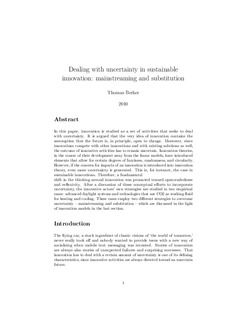| dc.contributor.author | Berker, Thomas | |
| dc.date.accessioned | 2017-11-01T09:17:02Z | |
| dc.date.available | 2017-11-01T09:17:02Z | |
| dc.date.created | 2010-08-13T11:49:04Z | |
| dc.date.issued | 2010 | |
| dc.identifier.citation | International Journal of Innovation and Sustainable Development. 2010, 5 (1), 65-79. | nb_NO |
| dc.identifier.issn | 1740-8822 | |
| dc.identifier.uri | http://hdl.handle.net/11250/2463356 | |
| dc.description.abstract | In this paper, innovation is studied as a set of activities that seeks to deal with uncertainty. It is argued that the very idea of innovation contains the assumption that the future is, in principle, open to change. Moreover, since innovations compete with other innovations and with existing solutions as well, the outcome of innovative activities has to remain uncertain. Innovation theories, in the course of their development away from the linear models, have introduced elements that allow for certain degrees of fuzziness, randomness, and circularity. However, if the concern for impacts of an innovation is introduced into innovation theory, even more uncertainty is generated. This is, for instance, the case in sustainable innovations. Therefore, a fundamental shift in the thinking around innovation was promoted toward open-endedness and reflexivity. After a discussion of these conceptual efforts to incorporate uncertainty, the innovative actors' own strategies are studied in two empirical cases: advanced daylight systems and technologies that use CO2 as working fluid for heating and cooling. These cases employ two different strategies to overcome uncertainty – mainstreaming and substitution – which are discussed in the light of innovation models in the last section. | nb_NO |
| dc.language.iso | eng | nb_NO |
| dc.publisher | Inderscience | nb_NO |
| dc.title | Dealing with uncertainty in sustainable innovation: mainstreaming and substitution | nb_NO |
| dc.type | Journal article | nb_NO |
| dc.type | Peer reviewed | nb_NO |
| dc.description.version | acceptedVersion | nb_NO |
| dc.source.pagenumber | 65-79 | nb_NO |
| dc.source.volume | 5 | nb_NO |
| dc.source.journal | International Journal of Innovation and Sustainable Development | nb_NO |
| dc.source.issue | 1 | nb_NO |
| dc.identifier.doi | 10.1504/IJISD.2010.034558 | |
| dc.identifier.cristin | 349432 | |
| dc.relation.project | Egen institusjon: 11 | nb_NO |
| dc.description.localcode | © 2010 Inderscience Enterprises Ltd. This is the authors' accepted and refereed manuscript to the article. | nb_NO |
| cristin.unitcode | 194,62,40,0 | |
| cristin.unitname | Institutt for tverrfaglige kulturstudier | |
| cristin.ispublished | true | |
| cristin.fulltext | postprint | |
| cristin.qualitycode | 1 | |
